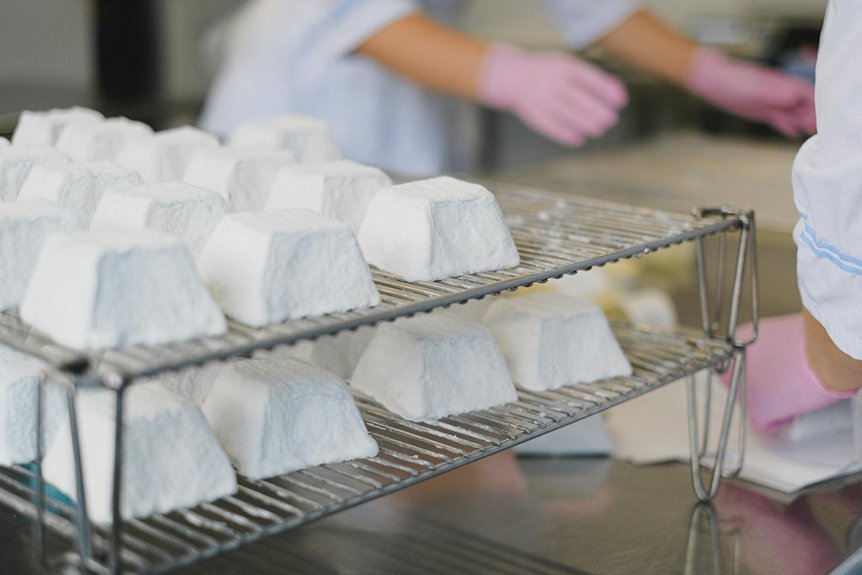
When you think of fermented foods, kombucha might come to mind first, but America’s fermentation scene extends far beyond this trendy tea. Your gut microbiome thrives on diversity, and the growing array of domestically crafted options—from small-batch kimchi to artisanal yogurts—delivers precisely that. Research indicates these foods don’t just taste unique; they introduce beneficial bacteria strains that commercial probiotics often lack. What makes these American-made ferments particularly effective for digestive health, and which varieties deliver the most significant benefits?
The Science Behind Fermentation and Gut Microbiome Health
While many food trends come and go, fermentation stands as a time-tested biological process with substantial scientific backing for gut health benefits.
When you consume fermented foods, you’re introducing live microorganisms that convert sugars into acids or alcohol, fostering beneficial probiotics in your digestive system.
Research demonstrates that these probiotics enhance microbiome diversity, a key indicator of gut health. This diversity strengthens your intestinal barrier function, reduces inflammation, and improves digestion.
The gut-brain axis connection further reveals how these microorganisms influence your mental wellbeing, affecting both mood and cognitive processes.
Regular consumption of fermented products like yogurt, kimchi, and sauerkraut replenishes your gut flora, creating a balanced microbiome that’s associated with enhanced immune function and decreased risk of chronic conditions. Bioma Probiotics, with their blend of prebiotics and probiotics, can further support this balance and overall digestive health.
Top American Craft Fermented Foods Gaining Popularity
As consumer awareness of gut health benefits grows, American craft fermented foods have experienced remarkable market expansion, evidenced by growth rates exceeding 20% annually.
You’ll find vegetable-based options like kimchi and sauerkraut from Farmhouse Culture and Bubbies dominating the market with their small-batch, sustainable production methods and high probiotic content.
Craft yogurt brands Noosa and Siggi’s offer innovative flavor profiles with enhanced probiotic counts, specifically targeting health-conscious consumers.
Meanwhile, the kombucha market has diversified significantly, with Health-Ade and GT’s Kombucha offering artisanal, organic varieties with functional ingredients.
Traditional fermented grains have also resurged, with local bakeries producing authentic sourdough and regional dairy producers crafting kefir using heritage techniques.
These products exemplify the growing American fermentation movement that emphasizes both traditional methods and quantifiable health benefits.
How Fermented Foods Support Digestive Wellness and Immunity
Probiotics, the living microorganisms found abundantly in fermented foods, create a robust foundation for digestive wellness and enhanced immunity. When you consume items like American-made yogurt, kimchi, and sauerkraut, you’re introducing beneficial bacteria that help balance your gut microbiota, significantly reducing the risk of gastrointestinal disorders.
The fermentation process transforms these foods into nutrient powerhouses, enhancing vitamin and mineral bioavailability crucial for immune function. Your body can absorb these essential nutrients more efficiently, strengthening your natural defenses.
Regular consumption of fermented foods stimulates the production of short-chain fatty acids, vital compounds that maintain gut integrity and support immune response. Additionally, some fermented products such as Gundry MD Bio Complete 3 are specifically designed to enhance gut health through a combination of probiotics, prebiotics, and postbiotics.
This gut-brain connection extends beyond physical benefits—you’ll likely experience improved mood and cognitive function, as emerging research connects a healthy microbiome with better mental health.
Comparing Traditional vs. Modern Fermentation Techniques
Traditional and modern fermentation techniques represent two distinct approaches to creating the gut-healthy foods increasingly central to American diets.
While traditional methods rely on wild fermentation with ambient microbes over weeks or months, modern techniques employ specific starter cultures that can reduce fermentation time to just days while maintaining probiotic benefits.
You’ll find traditional processes emphasize artisanal craftsmanship, utilizing salt and anaerobic conditions to cultivate beneficial bacteria.
In contrast, modern approaches incorporate controlled temperature and pH environments to optimize fermentation outcomes and enable mass production.
Both methods produce probiotic-rich foods, but research indicates significant variations in microbial diversity between approaches.
This difference potentially impacts the spectrum of gut health benefits you’ll receive, though either method delivers superior digestive support compared to non-fermented alternatives.
Incorporating Fermented Foods Into Your Daily Diet for Optimal Results
Now that you understand how fermentation techniques have evolved, the question becomes how to actually incorporate these beneficial foods into your everyday meals. Research indicates you should aim for at least one serving daily to maximize health benefits and promote a balanced gut microbiome.
Start by integrating familiar options like yogurt or kefir into breakfast routines. For lunch or dinner, add small portions of sauerkraut or kimchi as side dishes. These fermented foods provide essential probiotics that enhance your microbiome, supporting digestion and reducing gastrointestinal symptoms including bloating and constipation.
The consistency of consumption is critical—regular intake helps diversify gut bacteria, preventing dysbiosis and improving nutrient absorption.
Since 70% of your immune system resides in the gut, this dietary shift significantly bolsters overall immune function.
Conclusion
You’ve now seen how American-made fermented foods extend far beyond kombucha into a diverse ecosystem of gut-supporting options. Research confirms these products deliver significant microbiome benefits through their probiotic content. By integrating traditionally crafted kimchi, artisanal sauerkraut, or innovative yogurts into your daily regimen, you’ll enhance digestive function while strengthening immune response. The clinical evidence is clear: consistent consumption of quality fermented foods remains one of the most effective dietary interventions for sustained gut health.





